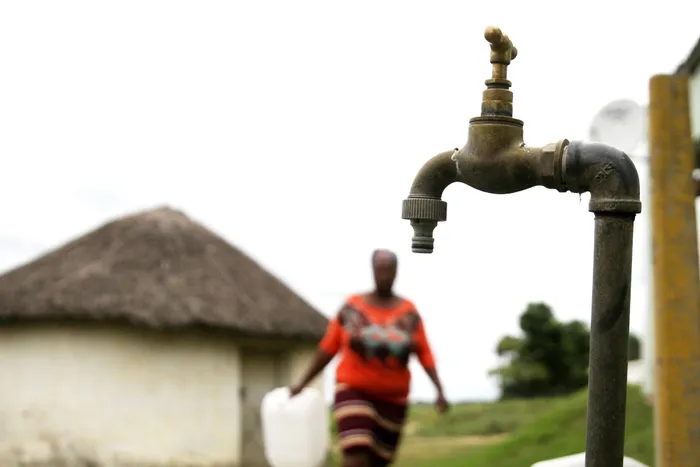SA Human Rights Commission report reveals water access challenges in areas across KZN

A woman is seen in the background as she approaches an outside tap. An outside tap seen in an area on the KwaZulu-Natal South Coast. The SA Human Rights Commission has released its report on access to water in the province. File Picture: Bongani Mbatha African News Agency (ANA)
Durban - The issue of poor or no access to water remains a daily challenge for many residents in KwaZulu-Natal, as well as for schools, businesses and other organisations across the province.
This is according to the executive summary of the SA Human Rights Commission KZN Water Inquiry report.
According to the report, which was released yesterday, most municipalities’ responses to complaints were inadequate in that they were unable to provide appropriate and sustainable redress to affected communities.
Therefore these complaints amounted to a “prima facie violation of the basic human right” to have access to sufficient clean water.
The commission conducted a five-day inquiry into access to water in KZN from August 15 to 19 last year. During the period, the commission said it engaged with and received submissions from stakeholders representing all corners of the province, from state and non-state actors and institutions, as well as individual members of communities and civil societies.
The commission’s provincial office has, since 2020, received more than 600 complaints regarding access to water. These complaints relate to wide-spread water shortages in communities; no access to water for more than seven days in some instances; inconsistent water supply or water disconnection issues; lack of alternative measures such as provisioning of water tankers; poor water quality and polluted water in some instances.
Complaints had also been received about water billing disputes.
It said it had found that the challenges experienced related to the delivery of water by municipalities to customers.
“These delivery issues are mostly occasioned by poor management, the lack of proper planning, the lack of accountability and leadership, and the failure to prioritise critical components necessary for effective service delivery.”
It said that other issues included illegal connections and the impact this has on the water-delivery system, the political environment of corruption, vandalism, and theft, coupled with the threats of the so-called business forums.
The commission made a raft of recommendations for the Department of Water and Sanitation, the Department of Co-operative Governance and Traditional Affairs (Cogta) and water boards.
The recommendations included that the Water and Sanitation Department pay more focused attention to monitoring the effective performance of water services institutions in the province and invoke powers, where necessary, in terms of section 63 of the Water Services Act to take over the water services function, in parallel with Cogta powers in terms of section 139 of the Constitution, to put municipalities under administration for failing to deliver water.
It further called on Cogta to review the funding model for municipalities and consider the provisioning of a special grant to effect upgrades and rehabilitation of critical water infrastructure and report to the commission within 12 months from the date of the report.
It said that Cogta must ensure that the KZN Water Master Plan considers the regression in municipality performance, and identifies radical measures to address this. “The Water Master Plan should further consider future demands for water and include these, noting, for instance, the impact of the floods on the plan and budget.”
Zwakele Mncwango, ActionSA KZN chairperson, said it noted with despair the water challenges documented in the report.
“The greatest cause for concern is the fact that although South Africa faces a scarcity of water, we have the ability to source and distribute water to communities, however, officials lack the will to do their work, directly infringing on the basic right of access to water,” he said.
“ActionSA believes that it is imperative that the link between provincial and local government be utilised in an effort to bring basic services to the people of our province.”
Related Topics: